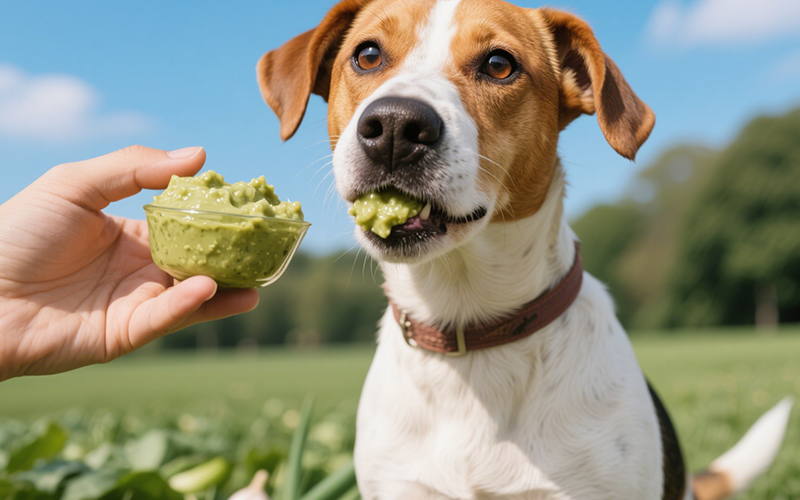Can Dogs Eat Pesto? Here’s What You Should Know
- 7 Apr 2025 16:50
Pesto is a delicious and flavorful sauce often made with fresh basil, garlic, olive oil, pine nuts, and Parmesan cheese. While it’s a popular ingredient in human cuisine, is it safe to share with your dog? Let’s explore whether dogs can eat pesto and the potential risks involved.

Can Dogs Eat Pesto? 🤔
No, dogs should not eat pesto. Although most of the ingredients in pesto aren't toxic to dogs in small amounts, many of them can pose health risks. The combination of garlic, olive oil, pine nuts, and cheese makes pesto a poor choice for your furry friend.
The Risks of Pesto for Dogs 🚨
Garlic Toxicity 🧄 One of the most significant risks of feeding pesto to dogs is garlic. Garlic is part of the Allium family (which also includes onions, leeks, and chives) and can be toxic to dogs. Even small amounts of garlic can cause symptoms like:
Lethargy 💤
Weakness 💪
Vomiting 🤢
Diarrhea 💩
Loss of appetite 🍽️
Garlic can cause oxidative damage to a dog’s red blood cells, leading to a condition called hemolytic anemia, which can be dangerous if not treated promptly.
High Fat Content 🧈 Pesto contains olive oil and sometimes other oils, making it high in fat. While fats are essential in small amounts for a dog’s diet, too much fat can lead to issues such as:
Pancreatitis (inflammation of the pancreas) 😷
Weight gain ⚖️
Digestive upset 💥
If your dog has a sensitive stomach or is prone to pancreatitis, the high-fat content in pesto can cause significant health issues.
Pine Nuts 🌰 Although pine nuts are not toxic to dogs, they can still pose a choking hazard or cause digestive upset if consumed in large quantities. Pine nuts are also high in fat, which can be problematic if given frequently.
Parmesan Cheese 🧀 Parmesan cheese, while not harmful in small amounts, is high in sodium and fat, which can contribute to obesity, heart problems, or kidney issues in dogs. Some dogs are also lactose intolerant, which could lead to gastrointestinal upset after eating cheese.
Basil 🌿 Basil itself is not harmful to dogs in small quantities and can even provide some health benefits like antioxidants and anti-inflammatory properties. However, the amount of basil in pesto is typically small, and it doesn’t outweigh the risks of the other ingredients.
What Happens If Your Dog Eats Pesto? 🚨
If your dog happens to eat pesto, the consequences can vary depending on the quantity consumed and the size of the dog. Small amounts of pesto may cause mild gastrointestinal upset, including vomiting and diarrhea. However, if your dog has consumed a larger quantity or has eaten pesto with a significant amount of garlic, it could be more serious and cause garlic toxicity or pancreatitis.
If you suspect your dog has eaten pesto and is showing symptoms like vomiting, weakness, or diarrhea, it’s important to contact a veterinarian immediately.
Safer Alternatives to Pesto for Dogs 🦴
If you want to treat your dog to something flavorful, there are many dog-safe alternatives that are much safer than pesto:
Plain Cooked Chicken 🍗
Grilled or boiled chicken (without any seasoning or garlic) is a great, healthy treat for your dog.Peanut Butter 🥜
Plain, unsweetened peanut butter (without xylitol) is a dog-friendly alternative that many pups love.Sweet Potatoes 🍠
Sweet potatoes are a nutritious, easy-to-digest treat that many dogs enjoy. They’re rich in fiber and vitamin A.Carrot Sticks 🥕
Carrots are a low-calorie, crunchy snack that helps clean your dog’s teeth and provides essential vitamins and minerals.Plain Yogurt 🧑🍳
If your dog isn’t lactose intolerant, a small amount of plain yogurt can be a tasty and healthy treat, rich in probiotics for digestive health.
How PettureX Can Help 🧠
If you’re ever unsure about what foods are safe for your dog or need advice on portion sizes, PettureX can help. With 24/7 consultations and pet image recognition, PettureX is a great resource to ensure you’re making the right choices for your dog’s health.
Conclusion: Can Dogs Eat Pesto? ❌
While pesto is a flavorful sauce that humans enjoy, it is not safe for dogs. The presence of garlic, high fat content, pine nuts, and cheese makes pesto a risky food choice for your furry friend. Instead, opt for healthier, dog-safe treats like chicken, carrots, or sweet potatoes. If you suspect your dog has eaten pesto and is showing signs of illness, contact your veterinarian immediately.
To keep your dog’s diet on track and get advice about food safety, try PettureX for 24/7 consultations and expert care!
Need help with your dog’s health or diet? Try PettureX for 24/7 consultations and expert care! 🐶💚
Related

Can Dogs Eat Peaches? Vet Explains Benefits, Cyanide Risks & Safe Serving
- 16 Apr 2025
Can Dogs Eat Mulberries? Vet Explains Safety, Benefits & Potential Risks
- 16 Apr 2025
Can Dogs Eat Mozzarella? Vet Explains the Cheesy Truth (Risks & Benefits)
- 16 Apr 2025
Can Dogs Eat Maple Syrup? The Sugary Truth & Why Vets Advise Against It
- 16 Apr 2025
Can Dogs Eat Mango Skin? Vet Explains Why It's a Risky Chew!
- 16 Apr 2025
Can Dogs Eat Mac n Cheese? Vet Explains Why This Comfort Food Is Unsafe!
- 16 Apr 2025
Can Dogs Eat Liver? Vet Guide to This Nutrient-Dense Organ Meat (Benefits & Risks!)
- 16 Apr 2025
Can Dogs Eat Lamb? Vet Insights on This Nutritious Meat Option
- 16 Apr 2025
Can Dogs Eat Licorice? The Sweet Danger & Glycyrrhizin Risk Explained by Vets
- 16 Apr 2025
Can Dogs Eat Jelly? The Sweet Truth About Sugar, Xylitol & Why Vets Say No!
- 16 Apr 2025
